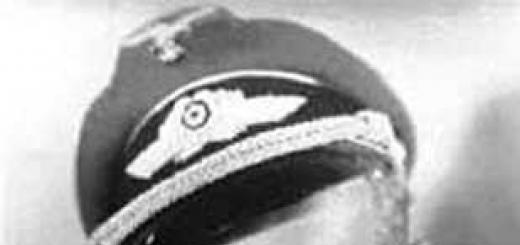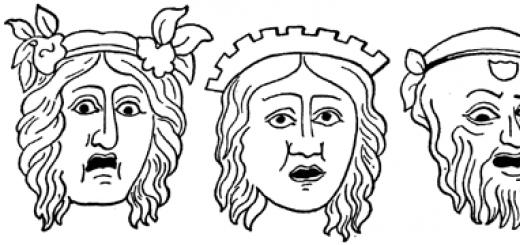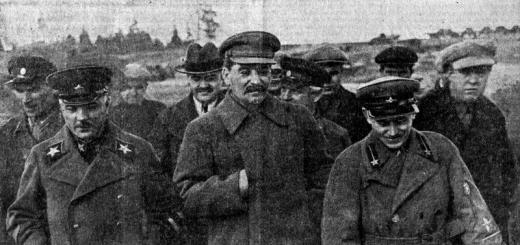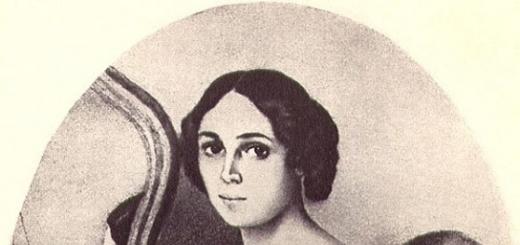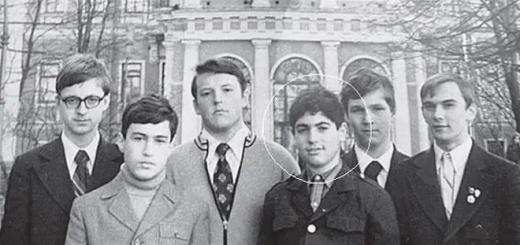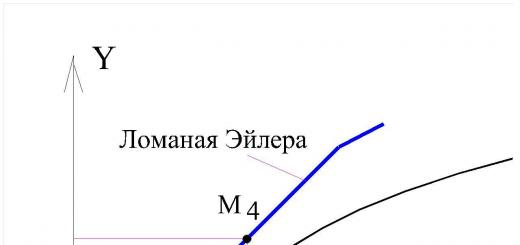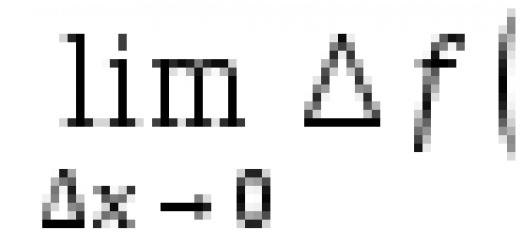“So I have accomplished my last feat,” thought Hercules, returning to Trakhini to his beloved wife and children. He did not know that the gods of Olympus would demand one more feat from him. A race of giants, the sons of Gaia-Earth, rebelled against the immortal celestials. Some of them were similar to people, albeit of enormous size, while others had bodies ending in balls of snakes. There were giants who were mortals, but they were not afraid of the gods, because they knew: by the will of Providence, only a mortal man could defeat them.
The day of the battle of gods and giants has arrived. Giants and gods met on the Phlegrian fields. The thunder of this battle echoed throughout the world. Not fearing death at the hands of the gods, the giants pressed the inhabitants of Olympus. They threw at them burning trunks of centuries-old trees, huge rocks and even entire mountains, which, falling into the sea, turned into islands.
In the midst of the battle, Hercules came to the aid of the gods. He was summoned by the daughter of Zeus, Pallas Athena. She, the wisest of the Olympian gods, guessed that the hero who is capable of destroying the tribe of giants is Hercules.
The mortal Hercules stood in line with the immortals. The string of his formidable bow rang, an arrow filled with the poison of the Lernaean Hydra flashed, and pierced the chest of the mightiest of the giants, Alcyoneus. The second arrow hit the right eye of the giant Ephialtes. The giants trembled and fled. But Hercules sent death to all of them, fleeing in panic from the battlefield, with his unmissable arrows.
“My gratitude knows no bounds,” Zeus said to Hercules after the battle. “Your body is mortal, but from now on your name will be immortal.”
And again the road. Hercules walks again through the mountains, forests and roads of Hellas. He goes home to his wife Dejanira, to his sons Gill, Glen, Ctesippus, Onitus, to his curly-haired daughter Macaria...
And Deianira, accustomed to her husband’s constant absence, was very worried this time. She was about to send her eldest son Gill in search of his father, but a messenger from Hercules appeared and said that her husband was alive and well, returning home and sending home gifts: jewelry, gold dishes and a captive - a girl of extraordinary beauty.
"Who's that girl?" - Dejanira asked. The messenger replied slyly: “Oh, this is not a simple captive, but the daughter of King Eurytus Iola, whom Hercules once wanted to marry.”
Dejanira saw that Iola was younger and more beautiful than her, and thought: “It seems Hercules has stopped loving me, and if he hasn’t stopped loving me yet, then he will certainly stop loving me soon.”
It was then that Dejanira remembered the dying advice of the centaur Nessus: with his dried blood she rubbed new, festive clothes, which she herself had woven for her husband, and sent them with a messenger to meet Hercules.
Hercules accepted his wife’s gift and wanted to put it on immediately. But as soon as the clothes touched the body, the poison of Nessus’s blood, mixed with the blood of the Lernaean Hydra, penetrated the body of Hercules.
It was as if a hot flame engulfed Hercules. He began to tear his damned clothes, but they grew to his body and caused unbearable torment. Tears rolled from Hercules' eyes. He, who did not bow to the most formidable dangers, who fought with monsters and even with gods, was now broken by the suffering that a weak, loving woman had brought upon him.
But there was no salvation...
When Deianira learned that she had killed her husband with her own hands, she threw herself on the sword on her marital bed.
To the valley where Hercules was dying, all his children from Deianira came, the elderly mother of Alcmene came, friends came - Iolaus, Philoctetes... With cold lips, Hercules said to them: “I don’t want to die here, not in this damp valley. Take me to a high mountain , so that the sea can be seen from it. There, in the open space, lay my funeral pyre. When I go to another world, you, my son Gill, take Iola as your wife, and let my descendants - the Heraclides - always live on earth. This is mine last will."
On the celestial Mount Etna, which rises above Thermopylae, in the reserved meadow of Zeus, a funeral pyre was laid for Hercules. The still living hero was placed on the skin of the Nemean Lion.
The torment of Hercules did not stop, and the son of Zeus prayed: “The dead have no suffering! Light the fire quickly! Deliver me from unbearable torment! Gill! My son! Be brave! Bring the torch to the fire!”
The son of Hercules was horrified: “Have mercy, father, how can I become your killer!?”
“You will not be a murderer, but a healer of my suffering,” Hercules answered Gill.
Here Philoctetes, a longtime friend and comrade of Hercules, approached the funeral pyre and set fire to the resinous logs.
“Bless you, Philoctetes, I give you my bow as a souvenir, take care of it,” Hercules’ last words were heard through the smoke rising to the sky.
The sun is already setting behind the western mountains. When it rises over the eastern sea, the daughter of Hercules, Macaria, will approach the burnt out funeral pyre and collect white ash - the remains of her father - into an urn.
And on the bright peak of Olympus, golden tables shine. There are more of them than there were before: there will be a feast for guests of the old and new worlds. All the gods of Olympus are waiting on the threshold of their monastery for the great hero of Hellas. A golden chariot appeared high in the sky. This is Athena rushing to the sacred mountain of the new god - Hercules, born mortal, but who earned immortality with his life.
“Rejoice, persecuted by me, glorified by me, exalted by me!” Hera greets Hercules. “From now on, as the husband of my daughter, the goddess of Youth Hebe, you will also be my son.
Hera hugs Hercules, and Hebe pours the groom a cup of nectar - the drink of immortality.
1. Hercules and Deianira
Hercules lived in Arcadian Pheneus for four years. He would have stayed here longer, but news came that the king of Aetolia Oeneus () was giving his daughter Deianira in marriage. “This is by the way! - Hercules said to himself. - It's time to start a family and children! I won’t be a bachelor forever!” And he went to Calydon. The city was buzzing like an agitated beehive. Grooms came here from all over Greece. After all, Dejanira was a beautiful girl, and her dowry came with a considerable amount! But how to choose the most worthy from many applicants? The king announced that he would give his daughter to the prince who would defeat all his rivals in the fight. He alone could make her happy! Upon learning of Oineus' decision, the suitors were confused. And not for nothing! The most powerful and huge among them was the river god Aheloy. His muscles bulged under his skin, and if he wanted, he could tie a bronze poker with a double knot. Try challenging this guy to a duel! True, Deianira did not like him at all. “I don’t want to marry Aheloy! - she repeated to her father. “His beard is green, like mud, and it always drips like wet laundry.” - “Nonsense! - answered Oineus. “But he is a god and knows how to turn into a large spotted snake.” And not just the snake! He can turn into a bull, if you just want to. Well, where will you find another husband like that?” But his arguments did not make any impression on the princess. She sat locked in her chambers and did not want to show herself to her betrothed.
Such things were happening in Calydon when Hercules came there. “I will fight Achelous! – he proclaimed. - I may not be a god myself, but through me you can become related to Zeus himself. Everyone knows that I am his son!” “Ho-ho,” answered Aheloy, “it has long been known: the more insignificant the rogue, the greater the kinship he boasts! How do you know who your father is? From your mom? So she could come up with something else!” Hercules frowned. “I see you are a master of wagging your tongue, Aheloy,” he said sternly. “As for me, I’m used to relying more on my hands!” The hero rushed at his opponent and wanted to put him on the ground. But that was not the case! The huge Aheloy stood unshakable like a rock. Hercules unsuccessfully attacked him three times, and finally managed to grab the enemy from behind. Then it was Aheloy’s turn to sound the alarm. Finding himself in the mighty embrace of the son of Zeus, he could not even move a finger. Hercules pressed him lower and lower to the ground, and in order not to be defeated, Ahelous turned into a huge snake. This cunning trick could confuse anyone, but not Hercules! “Bravo, Aheloy! - he shouted. – You couldn’t think of a better gift for me! Even in the cradle I learned to fight snakes!” He grabbed the enemy by the throat and squeezed him as if with pincers. Achelous realized that he had not found the best way out, and immediately turned into a powerful, cool bull. However, even in this guise he did not frighten Hercules at all. We remember that among his past exploits was the victory over the Cretan bull (), and this meant a lot! The hero bent his opponent to the ground with such force that he broke one of his horns. The hapless god had to admit defeat. Oineus was not very pleased with the outcome of the duel, but Deianira liked the new groom much more than the old one. She willingly agreed to marry him, and a few days later a cheerful wedding was celebrated.
Having married Deianira, Hercules lived in peace in Calydon. It seemed that long journeys and dangerous adventures were a thing of the past forever. Hercules dreamed of children, grandchildren and a calm old age, but everything turned out differently. Once during the feast, the boy serving at the table poured water on his hands, in which other guests had previously washed their feet. “Open your eyes, bungler! – the hero shouted to him. “Don’t you see, it’s slop!” He slapped the boy in the face and, without calculating his strength, killed him. Because of this involuntary crime, he again had to go into exile.
Dejanira did not want to leave her husband and followed him to a foreign land. Together they reached the Even River. It was spring. Because of the melt waters, the river overflowed its banks and spread widely across the plain. What to do here? Looking around, Hercules noticed a centaur nearby, wiping his wet sides with a lion skin. The name of this centaur was Nessus, and he transported travelers across the river for a fee. “It’s you that I need! – the son of Zeus rejoiced. - Take my wife to the other side. If you deliver it without getting your feet wet, I’ll pay you double!” The centaur agreed. Hercules sat Dejanira on his back, then threw his club, bow and arrows across the river and jumped into the cold water. Although he was very strong, the crossing was not easy for him. However, no one else could cope with such a stormy current! As soon as the hero stepped onto land, he heard the loud screams of his wife. What's happened? Looking around, Hercules saw Nessus, who, having embraced Deianira, was rapidly moving away from the shore. “So that's it! – the son of Zeus exclaimed angrily. “No other way, this half-horse wants to rob me!” And he was not wrong! The insidious centaur fell in love with the beautiful Dejanira at first sight and decided to kidnap her. Unfortunately for him, he didn’t realize who he was dealing with, and it cost him dearly. Without hesitating for a moment, Hercules pulled his bow and shot a deadly arrow after the thief. And although there was a considerable distance between them, it hit the target - it pierced Ness between the shoulder blades and, passing through his body, came out of his chest! The centaur felt that he was dying, let go of Deianira and fell to the ground in front of her. "Gorgeous! - he said. - Let's forget the grudges! I acted badly, but your husband has already gotten even with me! You were the last one I brought across the river, and I want to do you a favor. Collect my blood and save it! If Hercules ever stops loving you, soak his clothes with this blood, and you will regain his feeling again.” With these words, Nessus breathed his last. Dejanira took a travel jug from her bag, filled it with blood flowing from the wound, sealed it and hid it among her things.
2. Hercules and Aegimius
Hercules and his wife found shelter in Trakhina, Thessaly, with King Keik. Here, one after another, their children were born: four sons - Gill, Ctesippus, Glen, Onit - and a daughter, Macarius. Now Hercules became much more homely, and was not as willing as before to embark on adventures. But still he had to participate in several military campaigns.
One day, the king of the Dorians, Aegimius (), turned to the son of Zeus for help. Aegimius's kingdom was very tiny, and things were going very badly, because two warlike sovereigns took up arms against him at once - the king of the Lapiths, Coron, and the king of the Dryops, Leogor. A war with such powerful rivals did not bode well. Aegimius could only hope for a miracle, so he went to Trakhina to see Hercules. “I don’t know what you expect from me,” Hercules coldly answered the Dorian king. “It’s not easy to defeat the Lapiths, and there’s no reason for me to get involved in this risky business.” - "I don't think so! - Egimiy objected. “Firstly, by supporting the weak and unjustly offended, you will commit a godly act, and secondly, this matter concerns you much closer than you think” - “Why is this?” - asked Hercules. “You know that I have no heirs,” the king explained, “so I am ready even now to adopt any of your sons. Let him inherit the throne after my death!”
Hercules thought deeply. "Well! - he said finally. - This changes things. I will be your ally! And he really provided Egimius with the most active support. Having recruited a small army in Arcadia and united with the Dorians, Hercules first fought with the Lapiths and defeated them in a stubborn battle. King Coron and many of his subjects fell on the battlefield. Then the son of Zeus suddenly attacked Leogorus and killed him along with his sons while he was feasting in the temple of Apollo. Aegimius returned his possessions, and from that time on the Dorian people began to quickly increase their power.
3. The death of a hero
“There is one insult that I cannot forget!” – Hercules once admitted to his eldest son Gill. “Are any of your enemies still alive?” - he asked. “Yes, I swear by Olympus! - exclaimed the hero. - Eurytus, king of Oichalia, smokes the sky to this day! Two decades ago I defeated him in a fair competition. He should have called me his son-in-law, but instead he expelled me from the palace like the last rogue!()” “I had to hear about this vile act,” said Gill. “And since you and I remember, that means others remember him too,” said Hercules. “I cannot go to my grave without washing away this shame!”
The hero sent messengers to his friends among the Arcadians and Locrians, urging them to go on a campaign to Euboea. Nobody refused him. Gathering troops, Hercules approached Oichalia and, after a short siege, took possession of it. Eurytus, his sons, minions and advisers were all killed. After all, if the son of Zeus started a war, he never fought at half strength! Well, what about Iola? The unfortunate woman knew that the bitter fate of a slave awaited her and threw herself down from the high city wall. However, she did not crash and remained alive thanks to her skirts, which swollen from the wind and softened the blow. “Take the princess to Trakhina and keep your eyes on her! - Hercules ordered. – But don’t do her any harm! I know how to arrange her future fate!”
The prisoners were taken to Trakhina. Hercules sent the messenger Lichas with them. “Tell my wife that I am making sacrifices to the gods at Cape Keney,” he said. “Let him send a festive shirt and cloak there!” Lichas came to Deianira and informed her about her husband’s command. But she had her own thoughts on her mind. “What is the name of that beautiful woman who was brought to my house along with other captives? – Dejanira asked. “She’s not a slave, is she?” - “Of course not! - answered Likhas. - This is Iola, daughter of Eurytus! Hercules was looking for her hand shortly before he wooed you! It was because of her that he started this war! Now the poor thing is hurting and crying, but she will soon be comforted! I myself heard how Hercules promised to arrange her fate!”
Thus the talkative Lichas chattered and with his speeches aroused an alarming suspicion in Deianira’s soul. And any other woman in her place would feel uneasy! “Hercules was in love with Iola! - thought the daughter of Oineas. - Only Eurytus interfered with their marriage then! But now that all obstacles have been removed, my husband will certainly marry her!” These thoughts made Deianira feel bitter and offended. But she did not give in to despair for long, because she remembered the jug with the blood of the centaur Nessus, which she had carefully preserved all these years. “This is what will help me! - thought the daughter of Oineas. “Ness said: if I smear my husband’s clothes with this potion, it will return his love to me.” It's time to find out if he told the truth." Poor Dejanira! No one explained to her how dangerous it is to trust treacherous centaurs, especially when they are obsessed with revenge! The blood of Nessus, mixed with the bile of the Lernaean hydra, had long ago turned into a terrible poison and, of course, brought with it nothing but painful death. Without realizing it, Dejanira soaked a piece of wool in a jug, and then rubbed the blood on her husband’s shirt and cloak. Having packed the things into a luxurious casket, she handed it to Lichas with the words: “Hurry to Euboea and give this box to Hercules. Everything he asked for is here!” Likhas immediately set off on the return journey. When he left, Oeneus’s daughter accidentally glanced at the corner of the paved courtyard where she had previously dropped a used piece of wool. “Gods highest, what is this?” - she cried. There was something to be horrified about! Under the influence of the sun's heat, the wool decayed and turned to ashes, as if burned by fire, and poisonous foam appeared between the stones! Alarmed, Deianira rose to her chambers, but could not take up anything - all her affairs were falling out of her hands. With every minute her heart beat stronger and more anxiously. Finally, she couldn’t stand it anymore, called Gill and with tears confessed to him what she had done. "Son! - exclaimed Dejanira. - Take the fastest horses and ride after Lichas! The shirt and cloak are fraught with danger to life! Father shouldn’t wear them!” Gill did not force the request to be repeated twice. Jumping onto his chariot, he rushed at full speed to the seashore. His horses flew like arrows, urged on by the whip and a loud cry, but, alas, even though they were racing twice as fast, they were not able to make it in time!
Meanwhile, at Cape Keney, preparations were underway for a grand sacrifice. Hercules built twelve huge altars from stones - according to the number of the main Olympian gods. On each of them stood a pile of brushwood. The bulls and other animals selected for the sacrifice stood right there. It was just a matter of a festive cloak and shirt. But then Likhas appeared and handed the master the casket sent by his wife. Dressed in sacred clothes, Hercules lit the fires and slaughtered twelve mighty bulls one after another. Then he began to slaughter and burn smaller cattle, poured expensive wine on the altars and threw incense into the fire. It has been a long time since such abundant sacrifices have been made to the gods! Heated by work and the heat of the fires, Hercules kept wiping the sweat from his face and suddenly felt a burning sensation throughout his body - it was the hydra poison that had penetrated his skin!
Now nothing could save the hero! The pain grew with every moment and finally became unbearable. Cramps and terrible convulsions began. Having fallen to the ground, Hercules rolled between the altars screaming. He tore his clothes, but they did not come off, as if they had grown to him. Along with the fabric, the son of Zeus tore off his skin in rags, and this made his suffering completely unbearable. “Lichas! - Hercules shouted, “where did you get this cloak?” The unlucky messenger wanted to explain what was what, but the hero, without listening to the end, grabbed him by the leg and slammed him onto the ground so hard that he immediately came to an end. And it cannot be said that his death was completely undeserved! If Lichas had chatted less, you see, no trouble would have happened. No one dared to approach the unfortunate man after that. Finally Gill galloped up and hugged his groaning father. “I'm dying, son! - Hercules exclaimed. “Your mother poisoned me!” “No, father,” the young man answered with tears, “she is only to blame for trusting the villain!” And he told about Nessus’s insidious trick. “So that's it! – Hercules sighed. “Now I understand the meaning of an old prophecy. One day the Pythia predicted that I would die from the machinations of a dead enemy. It turns out that this enemy is Nessus! That’s when his revenge got to me.”
Gill ordered his father to be put on a cart and taken to the foot of Mount Eta near Trakhina. At this place, Hercules wished to give up his life. However, no matter how slow they were in driving their horses, the news of the hero’s fatal illness reached the city earlier. Pale as death, Dejanira silently listened to the messenger, went up to the bedroom and pierced her chest with a sword. Gill and Hercules learned of her death as they approached the city. The young man could not hold back his mournful sobs, and the dying hero sadly said: “Poor Dejanira! She judged herself too harshly. But let everyone know that I don’t blame her for my death.”
They soon reached Eta. Hercules ordered a huge fire to be built on its top. His torment was so terrible that death by fire seemed like a sweet deliverance. "Son! - he said. “Promise me that you will marry Iola.” - “How can you ask me for this, father? - Gill exclaimed. “This woman is to blame for all our misfortunes!” - “Don’t argue with me, my boy! - Hercules asked. - You yourself know that she is not to blame for anything. And with your refusal you only increase my suffering.” Gill agreed to fulfill his father's last wishes. Hercules climbed onto a pile of brushwood, spread a lion's skin over the logs, put a club under his head and ordered his son to set fire to the wood. “To do what you ask is to become your killer! - the young man objected. “Don’t ask me to do something that I can never do!” The hero began to ask others for this service, but no one dared to bring the deadly fire to his fire. “Gods Almighty! - Hercules then cried out. – Explain to these stubborn people that I am begging them for help! After so many years of hard work, exploits and battles, have I really not deserved what every mortal has - a peaceful death! But no! These people who call themselves my friends will calmly watch as the poison torments my insides! None of them will even lift a finger to save me from my torment!” At this time, a prince from Melibea named Philoctetes happened to be on the top of Eta. Hercules turned to him with the same prayer. And so that he would not hesitate, he promised a bow as a reward and, in addition, his famous poisoned arrows. Philoctetes, seduced by the reward, threw a lit torch into a pile of brushwood. Dry wood caught fire. Flames engulfed the hero's body from all sides and, after a short time, turned him to ashes...
Heroic Age
Alcmene. To woo Alcmene, Zeus took the form of her husband. Zeus' wife Hera made her husband promise that the one who would be born at a certain time would become a great king. Despite the fact that it was Hercules who was supposed to be at the appointed hour, Hera intervened in the process, as a result of which Hercules’ cousin named Eurystheus was born earlier. Nevertheless, Zeus agreed with Hera that Hercules would not obey his cousin forever, but would carry out only twelve of his orders. It was these acts that later became the famous 12 labors of Hercules.
Ancient Greek myths attribute many deeds to Hercules: from a campaign with the Argonauts to the construction of the city of Gytion together with the god Apollo.
Hera could not forgive Zeus for betraying him, but she took out her anger on Hercules. For example, she sent madness to him, and Hercules, in a fit, killed his own, born to the daughter of the king of Thebes, Megara. The prophetess from the temple of Apollo in Delphi said that in order to atone for his terrible act, Hercules must carry out the instructions of Eurystheus, who was jealous of Hercules’ strength and came up with very difficult tests.
The painful death of a hero
In twelve years, Hercules completed all of his cousin’s tasks, gaining freedom. The further life of the hero was also full of exploits, the content and number of which depend on the authors of specific myths, since there are quite a lot of ancient Greek monuments.
Most authors agree that, having defeated the river god Achelous, Hercules won the hand of Deianira, the daughter of Dionysus. One day, Dejanira was kidnapped by the centaur Nessus, who admired her beauty. Nessus carried travelers across a stormy river on his back, and when Hercules and Deianira approached the river, the hero put his wife on the centaur, and he himself went swimming.
Nessus tried to escape with Dejanira on his back, but Hercules wounded him with an arrow poisoned with the most powerful poison in the world - the bile of the Lernaean hydra, which he killed while carrying out the second order of Eurystheus. Nessus, dying, advised Dejanira to collect his blood, lying that it could be used as a love potion.
Earlier, Hercules mortally wounded his teacher and friend the centaur Chiron with an arrow poisoned by hydra bile.
After some time, Deianira learned that Hercules wanted to marry one of his captives. Having soaked the cloak in Nessus' blood, she sent it as a gift to her husband to return his love. As soon as Hercules put on his cloak, the poison entered his body, causing terrible torment.
To get rid of suffering, Hercules uproots trees, builds a huge fire from them, and lies down on the firewood. According to legend, the hero’s best friend Philoctetes agreed to set the funeral pyre on fire, for which Hercules promised him his bow and poisoned arrows.
It is believed that Hercules died at the age of fifty, after his death he was accepted among the immortals and ascended to Olympus, where he finally reconciled with Hera and even married her daughter.
Will rule over all relatives. Hera, having learned about this, accelerated the birth of Perseid's wife Sthenel, who gave birth to the weak and cowardly Eurystheus. Zeus involuntarily had to agree that Hercules, who was born after this by Alcmena, would obey Eurystheus - but not all his life, but only until he accomplished 12 great feats in his service.
From early childhood, Hercules was distinguished by enormous strength. Already in the cradle, he strangled two huge snakes sent by Hera to destroy the baby. Hercules spent his childhood in Thebes, Boeotia. He liberated this city from the power of neighboring Orkhomenes, and in gratitude, the Theban king Creon gave his daughter, Megara, to Hercules. Soon, Hera sent Hercules into a fit of madness, during which he killed his children and the children of his half-brother Iphicles (according to the tragedies of Euripides (“”) and Seneca, Hercules also killed his wife Megara). The Delphic oracle, in atonement for this sin, ordered Hercules to go to Eurystheus and, on his orders, perform the 12 labors that were destined for him by fate.
The first labor of Hercules (summary)
Hercules kills the Nemean lion. Copy from the statue of Lysippos
The second labor of Hercules (summary)

The second labor of Hercules was the fight against the Lernaean Hydra. Painting by A. Pollaiolo, c. 1475
The third labor of Hercules (summary)

Hercules and the Stymphalian Birds. Statue of A. Bourdelle, 1909
The fourth labor of Hercules (summary)

The Fourth Labor of Hercules - Kerenean Hind
The fifth labor of Hercules (summary)
Possessing monstrous strength, the Erymanthian boar terrified the entire surrounding area. On the way to fight him, Hercules visited his friend, the centaur Pholus. He treated the hero to wine, angering the other centaurs, since the wine belonged to all of them, and not to Fol alone. The centaurs rushed at Hercules, but with archery he forced the attackers to hide with the centaur Chiron. Pursuing the centaurs, Hercules burst into the cave of Chiron and accidentally killed this wise hero of many Greek myths with an arrow.

Hercules and the Erymanthian boar. Statue of L. Tuyon, 1904
The sixth labor of Hercules (summary)
King Augeas of Elis, the son of the sun god Helios, received from his father numerous herds of white and red bulls. His huge barnyard had not been cleared for 30 years. Hercules offered Augeas to clear the stall in a day, asking in return for a tenth of his herds. Believing that the hero could not cope with the work in one day, Augeias agreed. Hercules blocked the rivers Alpheus and Peneus with a dam and diverted their water to Augeas's farmyard - all the manure was washed away from it in a day.

The sixth labor - Hercules cleans the stables of Augeas. Roman mosaic from the 3rd century. according to R.H. from Valencia
The seventh labor of Hercules (summary)

The seventh labor - Hercules and the Cretan bull. Roman mosaic from the 3rd century. according to R.H. from Valencia
The Eighth Labor of Hercules (summary)

Diomedes devoured by his horses. Artist Gustave Moreau, 1865
The Ninth Labor of Hercules (summary)
The tenth labor of Hercules (summary)
On the westernmost edge of the earth, the giant Geryon, who had three bodies, three heads, six arms and six legs, was tending cows. By order of Eurystheus, Hercules went after these cows. The long journey to the west itself was already a feat, and in memory of it, Hercules erected two stone (Hercules) pillars on both sides of a narrow strait near the shores of the Ocean (modern Gibraltar). Geryon lived on the island of Erithia. So that Hercules could reach him, the sun god Helios gave him his horses and a golden boat, on which he himself sails across the sky every day.

The Eleventh Labor of Hercules (summary)

The Eleventh Labor of Hercules - Cerberus
The Twelfth Labor of Hercules (summary)
Hercules had to find the way to the great titan Atlas (Atlas), who holds the firmament on his shoulders at the edge of the earth. Eurystheus ordered Hercules to take three golden apples from the golden tree in the garden of Atlas. To find out the way to Atlas, Hercules, on the advice of the nymphs, lay in wait for the sea god Nereus on the seashore, grabbed him and held him until he showed the right road. On the way to Atlas through Libya, Hercules had to fight the cruel giant Antaeus, who received new powers by touching his mother, Earth-Gaea. After a long fight, Hercules lifted Antaeus into the air and strangled him without lowering him to the ground. In Egypt, King Busiris wanted to sacrifice Hercules to the gods, but the angry hero killed Busiris along with his son.

The fight of Hercules with Antaeus. Artist O. Coudet, 1819
Photo - Jastrow
The sequence of the 12 main labors of Hercules varies in different mythological sources. The eleventh and twelfth labors especially often change places: a number of ancient authors consider the descent into Hades for Cerberus to be the last achievement of Hercules, and the journey to the Garden of the Hesperides as the penultimate.
Other labors of Hercules
After completing 12 labors, Hercules, freed from the power of Eurystheus, defeated the best archer in Greece, Eurytus, king of the Euboean Oichalia, in a shooting competition. Eurytus did not give Hercules the promised reward for this - his daughter Iola. Hercules then married Deianira, the sister of Meleager, whom he met in the kingdom of Hades, in the city of Calydon. Seeking the hand of Deianira, Hercules endured a difficult duel with the river god Achelous, who during the fight turned into a snake and a bull.
Hercules and Deianira went to Tiryns. Along the way, Dejanira was attempted to be kidnapped by the centaur Nessus, who offered to transport the couple across the river. Hercules killed Nessus with arrows soaked in the bile of the Lernaean hydra. Before his death, Nessus, secretly from Hercules, advised Deianira to collect his blood poisoned by the hydra poison. The centaur assured that if Dejanira rubbed Hercules’ clothes with her, then no other woman would ever please him.
In Tiryns, during a fit of madness again sent by Hero, Hercules killed his close friend, the son of Eurytus, Iphitus. Zeus punished Hercules with a serious illness for this. Trying to find out a cure for it, Hercules went on a rampage in the Delphic temple and fought with the god Apollo. Finally it was revealed to him that he must sell himself into slavery for three years to the Lydian queen Omphale. For three years, Omphale subjected Hercules to terrible humiliation: she forced him to wear women's clothing and spin, while she herself wore the hero's lion skin and club. However, Omphale allowed Hercules to take part in the campaign of the Argonauts.

Freed from slavery to Omphale, Hercules took Troy and took revenge on its king, Laomedon, for his previous deception. He then took part in the battle of the gods with the giants. The mother of the giants, the goddess Gaia, made these children of hers invulnerable to the weapons of the gods. Only a mortal could kill giants. During the battle, the gods threw the giants to the ground with weapons and lightning, and Hercules finished them off with his arrows.
Death of Hercules
Following this, Hercules set out on a campaign against King Eurytus, who had insulted him. Having defeated Eurytus, Hercules captured his daughter, the beautiful Iola, whom he should have received after a previous competition with her father in archery. Having learned that Hercules was going to marry Iola, Dejanira, in an attempt to return her husband’s love, sent him a cloak soaked in the blood of the centaur Nessus, soaked in the poison of the Lernaean Hydra. As soon as Hercules put on this cloak, it stuck to his body. The poison penetrated the hero’s skin and began to cause terrible pain. Dejanira, having learned about her mistake, committed suicide. This myth became the plot of the tragedy of Sophocles and Demophon. The army of Eurystheus invaded Athenian soil, but was defeated by an army led by the eldest son of Hercules, Gill. The Heraclides became the ancestors of one of the four main branches of the Greek people - the Dorians. Three generations after Gill, the Dorian invasion of the south ended with the conquest of the Peloponnese, which the Heraclides considered the rightful inheritance of their father, treacherously taken from him by the cunning of the goddess Hera. In the news of the captures of the Dorians, legends and myths are already mixed with memories of genuine historical events.
A fight for the wife. Hercules performed many more feats while in the service of Eurystheus. He freed Prometheus, chained in the Caucasus mountains, and took part in the Argonauts' campaign for the Golden Fleece. He did not forget the promise made to Meleager in Hades - to marry his sister. He went to King Oeneus, her father, to ask for Deianira's hand. But he met a formidable rival there: the river god Aheloy also sought her consent. Oeneus decided that whoever emerged victorious in the fight would receive his daughter, and Hercules fought the mighty god in a duel. They fought for a long time, but Hercules defeated Achelous and gave Oeneus his daughter as his wife.
Deianira and the centaur Nessus. Hercules went home with his young wife. A wide river met him on the way: a centaur named Nessus transported travelers across it for a fee. Dejanira sat on his back, and Hercules began to swim. Suddenly he heard the loud cries of his wife calling for help, and saw that the centaur, captivated by the beauty of Dejanira, wanted to kidnap her. Hercules quickly got ashore, pulled his bow and fired a deadly arrow. It whistled in the air, overtook the centaur, pierced his back, and its tip came out through his chest. The mortally wounded Nessus fell to his knees, blood poured from his wound in a stream, mixed with the poison of the Lernaean Hydra. But he did not want to die unavenged. Gathering his last strength, Nessus turned to Deianira: “Oh, beautiful daughter of Oeneus! I am guilty before you, but I want to atone. Take my blood and keep it! If Hercules ever stops loving you, rub his clothes with this blood and you will again become dearer to him than all the women in the world!”
Dejanira did everything as the dying centaur told her. She collected his blood in a small vessel and hid it, but did not say anything to Hercules.
Campaign against King Eurytus. Years have passed. Hercules and Deianira lived happily. Their son Gill was born, and he grew up strong and handsome. One day Hercules went on a campaign against King Eurytus. A long time ago, even before marrying Deianira, Hercules wanted to marry Eurytus’s daughter Iola. He defeated all the suitors in the competition, but did not give him Euryt Iola. Hercules was angry and swore revenge. And now he conquered the city in which Eurytus ruled, killed him and his sons, and captured many prisoners. Among them was the beautiful Iola. Hercules sent the prisoners to his home, and he himself decided to first celebrate the victory and make sacrifices to the immortal gods.
Dejanira's jealous plan. Dejanira saw Iola, and jealousy crept into her heart. “Oh, it’s no coincidence that my husband sent a beautiful princess here! - she thought. “He wants to leave me and marry her!” This thought haunted Dejanira, and then she remembered Nessus’ dying gift. Dejanira took the vessel from a secret place: she kept it away from the rays of the sun and the fire of the hearth. She rubbed the blood and put the luxurious cloak that she had woven for her husband in a small box, called the servant and said: “Hurry to Hercules and give me my gift. Let him put it on when he makes a sacrifice to the great Zeus, and before that not a single ray of bright Helios should fall on the cloak.”
The servant went to Hercules. But gloomy forebodings gripped Deianira. She looked at the place where she had thrown the woolen rag soaked in the blood of the centaur, with which she had been rubbing her cloak, and saw that it had turned to ashes, and bloody foam appeared on the floor. Dejanira realized that her messenger was bringing Hercules’ death, but she could do nothing. She sent another messenger to her husband - but it was too late!
The suffering of Hercules and the death of Deianira. Hercules received a parcel from his wife at the very moment when he began the sacrifice. He was delighted: his wife remembers and loves him, since she sent him such a beautiful cloak! He put on Deianira's gift and approached the altar. On this day, the radiant Helios warmed the earth, and heat emanated from the sacrificial fire. The hero's body became covered with sweat, and suddenly he felt the poisoned cloak sticking to his body! Hercules screamed from unbearable pain, fell to the ground, began to tear off his damned clothes, but only the cloak stuck to his body more and more, and Hercules tore off pieces of it along with his own skin.
They brought Hercules on a stretcher to his home, where he learned the whole truth about the gift and exclaimed: “This means that the prediction of my father Zeus has been fulfilled! After all, it was predicted to me that I should not be afraid of living enemies, that from the machinations of a dead man I would descend into the dark kingdom of Hades!” The hero’s suffering was severe; Deianira was horrified when she learned about it. Unable to bear what she had done, she pierced her heart with a sharp sword.
Funeral pyre of Hercules. Hercules ordered his son to take him to the high Mount Eta. There, at the top, they built a huge funeral pyre and laid the greatest of heroes on it. The suffering of Hercules became more and more intense, and the poison of the Lernaean Hydra, mixed with the blood of the centaur, penetrated deeper and deeper into his blood. Death in flames is easier than such torment! But no one dared to set fire to the funeral pyre. Finally, a hero named Philoctetes came to the mountain, and Hercules turned to him: “Spare me from suffering, friend! Light the fire, and take my tight bow and deadly arrows for yourself!”
Philoctetes agreed. The flame of the fire flared up brightly, but the lightning of the great Zeus sparkled even brighter. Pallas Athena and Hermes were brought to the fire on a golden chariot, picked up the greatest of the heroes and carried him to Olympus. The gods met him there. Hera forgot her former hatred of Hercules and gave him her daughter, the eternally young goddess Hebe, as his wife. Since then, Hercules has lived on bright Olympus along with the immortal gods - this is how Zeus rewarded him for his earthly exploits and suffering.
